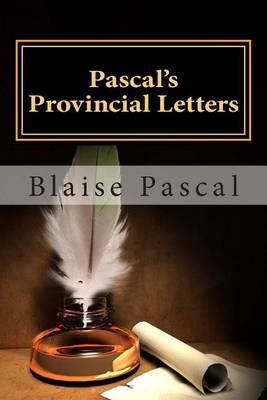Overview
Counted as one of his greatest works, Pascal's letters are a brilliant mix of acumen, well constructed argument, and withering wit. He launched an assault on the moral theology of the Jesuits during the height of the Jansenist controversy and left a rather amusing and enlightening work what is beautiful in its turn of both phrase and thought. The first half of the letters is Pascal's attempt to relate the opposing views in the controversy and to illuminate the Jesuit views in all their folly. The second half (which is, unfortunately, a bit more functional and less engaging) is a mix of parry and riposte as Pascal swats away the arguments of his opponents.
Full Product Details
Author: Blaise Pascal
Publisher: Createspace
Imprint: Createspace
Dimensions:
Width: 15.20cm
, Height: 1.50cm
, Length: 22.90cm
Weight: 0.386kg
ISBN: 9781494885137
ISBN 10: 1494885131
Pages: 286
Publication Date: 07 January 2014
Audience:
General/trade
,
General
Format: Paperback
Publisher's Status: Active
Availability: Available To Order

We have confirmation that this item is in stock with the supplier. It will be ordered in for you and dispatched immediately.
Author Information
Blaise Pascal (1623-1662), was a French mathematician, physicist, inventor, writer and Christian philosopher. He was a child prodigy who was educated by his father, a tax collector in Rouen. Pascal's earliest work was in the natural and applied sciences where he made important contributions to the study of fluids, and clarified the concepts of pressure and vacuum by generalizing the work of Evangelista Torricelli. Pascal also wrote in defense of the scientific method. In 1642, while still a teenager, he started some pioneering work on calculating machines, and after three years of effort and 50 prototypes he invented the mechanical calculator. He built 20 of these machines in the following ten years. Pascal was an important mathematician, helping create two major new areas of research: he wrote a significant treatise on the subject of projective geometry at the age of 16, and later corresponded with Pierre de Fermat on probability theory, strongly influencing the development of modern economics and social science. Following Galileo and Torricelli, in 1646 he refuted Aristotle's followers who insisted that nature abhors a vacuum. Pascal's results caused many disputes before being accepted. In 1646, he and his sister Jacqueline identified with the religious movement within Catholicism known by its detractors as Jansenism. Following a mystical experience in late 1654, he had his second conversion, abandoned his scientific work, and devoted himself to philosophy and theology. His two most famous works date from this period: the Lettres provinciales and the Pensees, the former set in the conflict between Jansenists and Jesuits. In this year, he also wrote an important treatise on the arithmetical triangle. Between 1658 and 1659 he wrote on the cycloid and its use in calculating the volume of solids. Pascal had poor health especially after his 18th year and his death came just two months after his 39th birthday.




